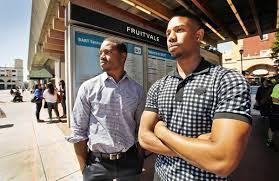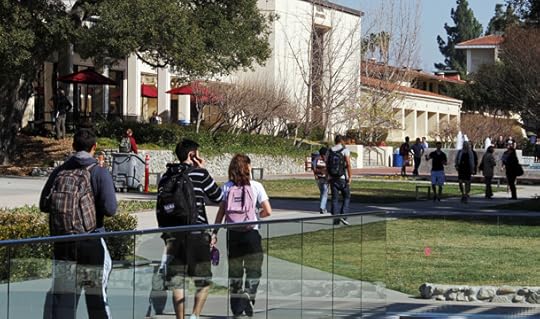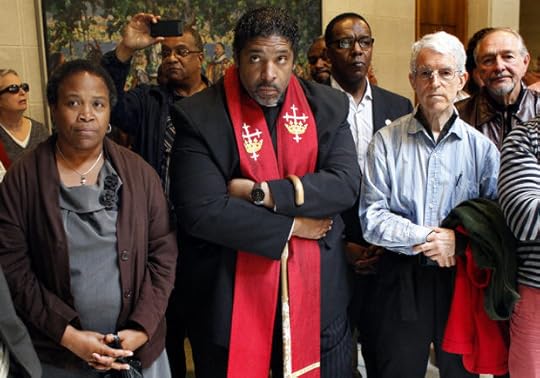Mark Anthony Neal's Blog, page 878
August 3, 2013
'Picasso Baby: A Performance Art Film'
Life+Times
JAY Z: "Picasso Baby: A Performance Art Film." Directed by Mark Romanek.
Published on August 03, 2013 08:18
"Time For All Workers to Stand Up": Striking Fast-food Employee Urges Popular Movement For Wage Hike
Democracy Now
A national strike for a living wage and the right to unionize in the fast food and retail sectors has spread across seven cities. Hundreds of workers walked off the job Thursday in Milwaukee, and before that in Chicago, St. Louis, Kansas City, Detroit, Flint and New York City. "What else do we have to lose? We are already slowly dying in our day to day lives. So why not speak up, and stand up, and let the nation know that we are suffering? This is this is really a cry for help. This great nation should not turn its back on working class people that need help," says our guest Terrance Wise, who works at both Burger King and Pizza Hut and is a member of the Stand Up Kansas City campaign.
Published on August 03, 2013 05:28
August 2, 2013
Moving Beyond the Jay Z - Harry Belafonte Beef: A Conversation with Bakari Kitwana & Mark Anthony Neal
Rap Sessions | Left of Black
Following a week-long media frenzy surrounding the rift between icons Jay-Z and Harry Belafonte, Bakari Kitwana of Rap Sessions and Mark Anthony Neal of Left of Black sat down to unpack the shortcomings of the recent Jay Z - Belafonte debate. Rather than perpetuating the beef between the Civil Rights Generation and the Hip-Hop Generation, they insist the moment should be seen as opportunity to chart a course for moving beyond media sound bites to action. Mark Anthony Neal’s essay “My Passport Says Shawn: Toward a Hip-Hop Cosmopolitanism” (in his new book Looking for Leroy: Illegible Black Masculinities ) and Bakari Kitwana’s essay “Zen and the Art of Transcending the Status Quo” (in the anthology Jay-Z: Essays on Hip-Hop's Philosopher King , edited by Julius Bailey) are the starting points for this discussion.
Published on August 02, 2013 13:19
Drea d'Nur: "Cry for Change" (Video)—a Meditation on Black Male Violence
FREE DOWNLOAD HERE:https://soundcloud.com/dreadnur/cryfo...
Written by: Drea d'Nur
Twitter: @drea_dnurFB: Drea dNur
This video was filmed and edited by Matthias Miemczyk, B.A.
Drea d'Nur with The Digflo Band. Recorded in Cologne, Germany, June 2012.
Published on August 02, 2013 12:20
Reality 'Written in Lightening': On 'Fruitvale Station' by David J. Leonard
 (Al Seib/Los Angeles Times)
Reality Written in Lightening: On Fruitvale Station
by David J. Leonard | NewBlackMan (in Exile)
(Al Seib/Los Angeles Times)
Reality Written in Lightening: On Fruitvale Station
by David J. Leonard | NewBlackMan (in Exile) Walking out of the theater in West Los Angeles, I felt a lot of emotions. Even before Ryan Coogler’s Fruitvale Stationstarted, I felt the film at a visceral level: I was sad, anxious, angry, and disheartened as I sat down. Emotionality is central to the film.
As brilliant as the film is at tapping into the emotionality of Oscar Grant’s killing, it is not simply a film of anguish or one that builds upon the outrage and sadness compelled by murders #every28hours. It is a work of art; a tapestry of images, narratives, and movements. It is a story of depth about a layered life put together through sight and sound, image and voice.
There is a lot to be said about the film at an intellectual, artistic, and cinematic level. For example, Coogler’s ability to “make Oakland a character”is crucial to the film; it is done with great precision and depth. The shots of street signs, the Bay, BART, and several Oakland landmarks are critical to the film’s situating of Grant’s life and death within a physical landscape. To understand Oscar Grant and to reflect on his death, requires an ability to see and hear, feel and understand, Oakland in post civil rights, post 9/11 America. His life and death is a story of Oakland; it is also a story of neighborhoods and communities across the nation.
With its use of the camera, from the close-ups of Tatiana scrubbing crabs to the various moments that brought Grant’s humanity to life, Fruitvale Station forces viewers to not only confront Grant’s death and his killing in 2009, but his life: his relationship with his girlfriend, Sophina (Melonie Diaz); his adoration for his mother Wanda Johnson (Octavia Spencer) and sister; his beautiful interactions with his daughter; and the many obstacles he faced in an unforgiving America. Wesley Morris offers an important assessment of the film when he writes:
Fruitvale Station speaks to that yawning discrepancy. What feels slight, shaggy, and ordinary about it is also rather remarkable. To present Grant this way — as a son who loves his mother, as a father who loves his daughter, as the sort of person who comforts a dying dog and pleads with a shop owner to permit a pregnant woman to use his restroom — is to remove the stigma. He's a lower-middle-class kid who got mixed up with crime. But most of the narrative belongs to a charming, charismatic, devoted young man, someone striving to better himself. It's not only that this Grant is a person. It's that, to a fault, he's made to be more than black male pathology.
Rahiel Tesfamariam similarly emphasizes the film’s cinematic and narrative success in humanizing Grant – in challenging the systemic flattening of black bodies. Fruitvale Station gives voice to Grant and the injustice evident in his death and in doing so challenges America’s racial landscape.
We also see this vulnerability play out in his dealings with the matriarchs in his family... These women are his anchors in life. Sophina keeps him honest, holds him accountable and brings out his sensual side. Through their relationship, we see his desire to be a protector and provider. His mother Wanda grounds him in prayer and nurtures him through wise words and good food. Her “tough love” approach often haunts him in his actions and decision-making. Then, there’s Grandma Bonnie who keeps him connected to tradition and the family history that proceeds him.
This backdrop is so important to the film, and to a larger landscape of anti-black racism; yet as I watched and cried, I found myself asking myself: does the persistence of segregation in Hollywood constrain the impact of such an important film? Does the nature of distribution limit the reach of films centering African American voices and experiences into “red state America”?
Given the ubiquity of the criminalized black body, and given the widespread practice of blaming Grant or Trayvon Martin for their own deaths, it is disheartening to know that those who continue to peddle and profit in/from anti-black racism will unlikely watch Fruitvale Station.
It is infuriating that those who blame inequality on “single mothers” and “children born out-of-wedlock” will never be forced to digest the beautiful relationship that Tatiana had with her father Oscar, who would be part of that 72% statistic cited without any thought over and over again.
The anger I felt is about the killing of Oscar Grant – and Trayvon Martin, Jordan Davis, Ayana Jones-Stanley, Rekia Boyd, Amadou Diallo; yet it was about a theater with only a handful of people; it is about knowledge of multiplexes across the country screening zombie movies and another about a snail rather than films that have the potential to transform a generation. It is about knowledge that Madea, the Help, or the Butler will more likely be screened than the stories of Oscar Grant or Ruby.
Frustration, sadness, and anger.
Almost 100 years after the release of D.W. Griffith’s Birth of a Nation, a film steeped in white supremacy and anti-black violence, Fruitvale Station brings a level of black humanity that has remain on the periphery of the Hollywood imagination for a century. Almost 100 years after the release of a film that celebrated the rise of the Klan as the necessary force to thwart black savagery, Fruitvale Station stepped into a cinematic and larger racial landscape to offer a powerful counter narrative to the anchors of contemporary racism. Yet, 100 years after Birth of a Nation was celebrated as “history written in lightening,” the prospect of Fruitvale Station receiving similar treatment feels to the right of impossible.
As with the struggle for justice itself, the actual hearing and seeing of Grant, Martin, Diallo, and so many others remains a distant possibility. As with the activists who have used their cell phones to document the specter of police violence and anti-black/brown racism, Coogler uses his camera to further force a nation to confront these realities. Fruitvale Station shines a spotlight on this empathy deficit and the denied humanity. And like the killing of Grant, this is the source of my frustration, sadness, and anger.
But be clear, Fruitvale Station is reality written in lightening; a piercing ray of truth telling that is painful. It is a disheartening, infuriating, and devastating reality; one that everyone should confront before another train arrives at Fruitvale Station. ***
David J. Leonard is Associate Professor in the Department of Critical Culture, Gender and Race Studies at Washington State University, Pullman. Leonard’s latest books include After Artest: Race and the Assault on Blackness (SUNY Press) and African Americans on Television: Race-ing for Ratings (Praeger Press) co-edited with Lisa Guerrero. He is currently working on a book Presumed Innocence: White Mass Shooters in the Era of Trayvon about gun violence in America.
Published on August 02, 2013 09:39
August 1, 2013
Jay Smooth On Don Lemon, Race and "Respectability"
Ill Doctrine
Responding to Don Lemon's dubious advice for young black men.
Published on August 01, 2013 14:06
'Separate And Unequal': Racial Divides In Higher Ed
Published on August 01, 2013 07:31
Beyond 'Moral Monday': Rev. William Barber Talks with 'Tell Me More'
Published on August 01, 2013 07:23
July 31, 2013
The Schomburg Presents: Visually Speaking—Contemporary Photojournalism in America
Schomburg Center
Visually Speaking was a photographic panel series that examined the current state of photojournalism through the lens of photographers and image makers of the African Diaspora. Panelists for this series included Marilyn Nance, James McGrawth, Ozier Muhammad, Terrence Jennings, Michelle Agins and moderator Grace Aneiza Ali.
Published on July 31, 2013 19:55
Spike Lee Talks Old Boy, Kickstarter & Trayvon Martin
GlobalGrindTV
Spike Lee sits down with Xilla Valentine to discuss his new movie Old Boy and his latest venture of trying to fund a movie via Kickstarter.
Published on July 31, 2013 14:40
Mark Anthony Neal's Blog
- Mark Anthony Neal's profile
- 30 followers
Mark Anthony Neal isn't a Goodreads Author
(yet),
but they
do have a blog,
so here are some recent posts imported from
their feed.





